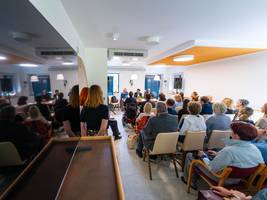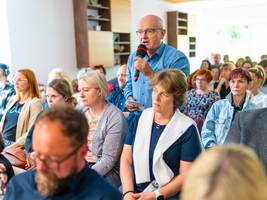Slovenia is currently ranked among the countries with the highest level of institutionalisation in Europe in terms of the number of people who live and perform most of their activities in 24-hour organised care or institutions. We are still far from realising the process of deinstitutionalisation in practice, thereby missing the opportunity to establish a more connected and solidary society, emphasised Human Rights Ombudsman Peter Svetina as he introduced the consultation entitled Deinstitutionalisation – A Necessary Process for Ensuring Human Rights, on Wednesday, 29 May 2025, in Nova Gorica.
"A person must be able to make independent and autonomous decisions about how and where they will spend their life. In my opinion, we have not yet internalised the fact that everyone has the right to live in the community," said the Ombudsman. He is convinced that in Slovenia we are witnessing the fragmentation of institutional arrangements, not true deinstitutionalisation. The consultation participants agreed that deinstitutionalisation depends above all on the understanding that, as a community, we are obliged to take care of each and every member of society in the environment in which they live. They also agreed that the reform of the system should focus on a single goal: individual support that promotes full integration into the community.
In the first part of the consultation, Peter Svetina spoke with Professor at the Faculty of Social Work Dr. Vito Flaker and with the director of Dom upokojencev Nova Gorica, Bojan Stantet. In the second part of the consultation, the Deputy Ombudsman Dr. Dijana Možina Zupanc led her interlocutors through reflections on opportunities and challenges in practice. At the end of the consultation, the participants adopted conclusions and formulated recommendations (below). At the end of the consultation, the participants adopted conclusions and formulated recommendations (below). The Ombudsman calls on the competent ministers, the Prime Minister of the Republic of Slovenia, and the National Assembly of the Republic of Slovenia to start immediately implementing the recommendations from this consultation and to commit to their implementation with a concrete timeline.
As one of the first to do so, Professor at the Faculty of Social Work Dr. Vito Flaker already helped establish some deinstitutional forms in practice more than 30 years ago. He emphasised that the current two-tier system of institutions and community support creates confusion about what human-worthy care is, is very expensive and, on top of that, puts the "community arm of care" in a subordinate position. This can only be overcome with more will, both political and popular, he is convinced. "Deinstitutionalisation is not simply the abolition of closed spaces for storing people, but actively breaking patterns of exclusion and discrimination. The community must become not only the place where care is provided, but also its actor, because the return of people from institutions to the community opens up many questions about how to live together," emphasises Dr. Flaker.
Director of Dom upokojencev Nova Gorica, Bojan Stante, who with his colleagues implements the principles of deinstitutionalisation in practice, outlined some of the key obstacles he has encountered in the implementation of deinstitutionalisation. The establishment of new premises of the Hiše dobre volje in Nova Gorica, where a residential community for the elderly and a day care centre for the elderly will come to life in June, showed systemic deficiencies and the inadequacy of the current legislation, which does not follow the needs of the transformation of institutional care into non-institutional care.
Deinstitutionalisation and independent living of disabled people, especially those with more severe forms of disability, is currently only possible in practice through personal assistance, stressed the president of the National Council of Disabled Organisations of Slovenia (NSIOS), Mateja Toman, MA. The range of services based on the rights defined by other laws, which might even be more appropriate than personal assistance for some beneficiaries, is limited to the extent that it cannot provide the individual with the necessary support he or she needs. "We are particularly concerned about the area of long-term care, both because of the problems with the too slow implementation of care at home and also because of the insufficient range of services, which does not allow for a quality stay in the home environment," she added.
Jože Kropivnik, director of CUDV Črna na Koroškem, recalled that the key to the success of deinstitutionalisation is good cooperation, and it must be carried out with the user and for the user to the extent that they are able to do so. "However, we must not forget about adapting the legislation, which is not only about adapting norms and infrastructure, but also about changing work processes and creating conditions for the successful integration of users into local environments," Koprivnik underlined, adding that at the key to finding appropriate ways to integrate into the community is not to interfere with the rights of others.
The Association of Pensioners' Associations of Slovenia (ZDUS) believes that it is necessary to develop both community and institutional forms of care for the elderly. They expect that only highly empathetic, qualified people will come into contact with the elderly in institutions, who will be suitably rewarded and respected, said ZDUS president Zdenka Jan. With their programme developed 20 years ago, with the help of 3,500 volunteers, they try to reach the elderly over 69 and help them in their hardships and relieve the burden on their relatives. At the same time, in this way, they also obtain information about the violence against them, thereby stopping or even preventing this inhumane treatment, she added.
President of the association Ozara, mag. Bogdan Dobnik, said that deinstitutionalisation has a significant impact on the destigmatisation of people with mental health problems, their inclusion in society, increased participation, and strengthening of their power. It also encourages the creation of services based on the everyday needs of these people. Therefore, it must not remain just a dead letter on paper and a word that is difficult to pronounce, but must become our shared vision, with which we can ensure adequate care for everyone in the community. Only in this way will we create a fairer and more inclusive society for everyone.
In order to be able to talk about real deinstitutionalisation, it is necessary to understand its importance and to approach the realisation of too many projects and to revive and support good practices that arose in the country through the initiatives of individuals, but so far have not been heard by the decision-makers, stressed Deputy Ombudsman Dr. Dijana Možina Zupanc.
At the end of the consultation, the participants adopted conclusions and made the following recommendations:
- The Ombudsman recommends that the state establish a comprehensive process of deinstitutionalisation in a non-discriminatory manner, for all persons, regardless of age or any other personal circumstances. Unfortunately, the deinstitutionalisation strategy adopted in March this year only applies to children and adults with disabilities, but not to the elderly.
- Everyone has the right to live in the community, so the central goal of the renovation of the existing system must be individual support, which promotes full integration into the community and at the same time encourages intergenerational cooperation.
- The process of deinstitutionalisation in Slovenia is too slow, deficient, and ineffective. There is an immediate need to establish well-functioning various individualised forms of assistance and social and health services, such as home assistance, assisted living, accessible personal assistance for all forms of disability, a strong patronage service, and others. For all of the aforementioned services, it is necessary to ensure that the public is informed about them in an appropriate and transparent manner (in principle, everything in one place).
- The Ombudsman recommends that the state provide adequate additional and regular training for employees and other assistance providers in this sector, so that the services are provided professionally and effectively. Services must be provided in accordance with adjusted standards and norms, and the work must be properly evaluated and paid for.
- Changes to the legislation and by-laws are necessary, which will enable an accessible, efficient, and financially sustainable flexible system, aimed at providing an adequate supportive environment and high-quality and safe care that comes from people and their needs. The state should also establish a framework that will enable existing social welfare institutions to upgrade their services in the direction of community care.
- Only a society that, right through the education process, systematically takes care of empowerment and education in this area, will be able to take care of actual deinstitutionalisation or community care in practice in an inclusive and empathetic way.
The Ombudsman calls on the relevant ministers, the Prime Minister of the Republic of Slovenia and the National Assembly of the Republic of Slovenia to start immediately implementing the recommendations from this consultation and to commit to their implementation with a concrete timeline.
![[Translate to English:] Prof. dr, Vito Flaker, Fakulteti za socialno delo, varuh človekovih pravic, direktorjem Doma upokojencev Nova Gorica Bojan Stante](/fileadmin/_processed_/8/4/csm__JK54883_57795df37e.jpg)


![[Translate to English:] Udeleženci posveta](/fileadmin/_processed_/4/e/csm__JK55125_dca3c88ff3.jpg)
![[Translate to English:] Direktorica Zveze Sožitje Mateja De Reya](/fileadmin/_processed_/c/e/csm__JK55019_90f44db59c.jpg)